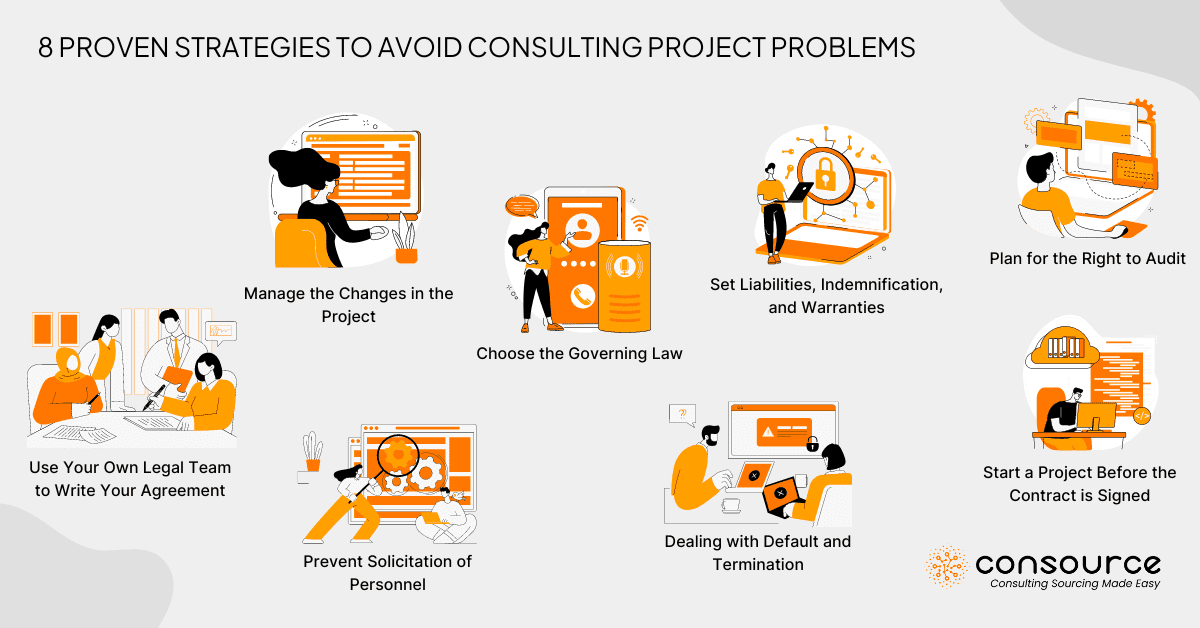Projetos de consultoria eficazes são essenciais para o crescimento, a inovação e a capacidade de resolução de problemas de uma organização. No entanto, infelizmente, não há garantias na vida, portanto, sua melhor aposta é ter um acordo sólido e preparar a si mesmo e a sua organização para lidar com quaisquer problemas inesperados em projetos de consultoria. Lembre-se de que todos os problemas têm uma solução e, quanto melhor for o seu planejamento, melhor será o resultado.
Este guia abrangente descreve oito práticas recomendadas para ajudá-lo a evitar possíveis problemas durante um projeto de consultoria. Desde considerações legais até o gerenciamento de mudanças e a garantia de responsabilidade, essas estratégias o equiparão para lidar com desafios inesperados de projetos de consultoria e levar seus projetos ao sucesso. Por gerenciamento de projetos de consultoria Com essas diretrizes, você pode garantir operações mais tranquilas e melhores resultados.
Use sua própria equipe jurídica para redigir seu contrato
A base de um projeto de consultoria bem-sucedido está em um contrato bem elaborado. Usar a sua equipe jurídica para redigir esse contrato garante que você tenha um entendimento completo do seu conteúdo e possa adaptá-lo às suas necessidades específicas. Os principais elementos a serem incluídos são o escopo do trabalho, o cronograma, a governança e as métricas de desempenho. Esses componentes devem ser definidos com precisão para evitar ambiguidades que possam levar a disputas posteriores.
Além disso, é fundamental incluir disposições para proteger seus interesses comerciais em caso de cenários inesperados. Isso inclui a definição de regras básicas claras para o provedor de consultoria, detalhando o que se espera dele e delineando as consequências do não cumprimento. Com um contrato sólido, você prepara o terreno para uma colaboração tranquila e reduz o risco de mal-entendidos.
Gerenciar as mudanças no projeto
Quando um projeto de consultoria é iniciado, não é incomum que ocorram mudanças. Essas mudanças, se não forem gerenciadas adequadamente, podem interromper o projeto e gerar conflitos. Para minimizar o impacto das mudanças, limite-as o máximo possível e certifique-se de que todas as alterações no escopo, no orçamento ou no cronograma do projeto sejam documentadas formalmente. Inclua uma cláusula em seu contrato que exija que todas as alterações sejam feitas por escrito, o que ajudará a evitar disputas e garantirá que todas as partes estejam na mesma página.
A manutenção de um registro detalhado das alterações e suas justificativas ajuda a manter o projeto alinhado com seus objetivos originais. Essa transparência não apenas promove a confiança entre você e o provedor de consultoria, mas também fornece um rastro claro das decisões que podem ser consultadas em caso de divergências.
Escolha a lei aplicável
A escolha da lei aplicável é um aspecto fundamental de qualquer contrato. Essa estrutura jurídica regerá a forma como as disputas serão resolvidas e poderá afetar significativamente o resultado em caso de conflitos. Discuta com sua equipe jurídica quais leis da jurisdição protegeriam melhor seus interesses. Seu provedor de consultoria também pode ter preferências, portanto, é essencial negociar e encontrar uma solução mutuamente aceitável.
Ao selecionar cuidadosamente a lei aplicável, você garante que terá uma base jurídica confiável para recorrer em caso de disputas. Essa previsão pode economizar tempo e recursos consideráveis, fornecendo um caminho claro para a resolução de qualquer problema que surja durante o projeto.
Impedir a solicitação de pessoal
A guerra de talentos é feroz na consultoria, assim como pode ser em seu próprio setor. Uma regra saudável é proibir-se de roubar os melhores talentos da empresa de consultoria e, em troca, exigir o mesmo. Para proteger sua equipe e manter a integridade da equipe de seu provedor de consultoria, inclua uma cláusula de não solicitação em seu contrato.
Essa disposição não apenas protege sua força de trabalho, mas também garante que a equipe do provedor de consultoria permaneça intacta, mantendo a qualidade e a consistência de seus serviços. Esse respeito mútuo pela equipe de cada um promove uma relação de trabalho mais saudável e colaborativa.

Definir responsabilidades, indenizações e garantias
Limitar a responsabilidade é uma consideração importante ao firmar um contrato de consultoria. As cláusulas de garantia e indenização ajudam a gerenciar a exposição financeira e a proteger ambas as partes. Normalmente, o provedor de consultoria procurará minimizar sua responsabilidade, portanto, é fundamental negociar termos que equilibrem isso com sua necessidade de proteção.
Inclua limitações de responsabilidade e isenções de garantia em seu contrato. Essas cláusulas definem a extensão das responsabilidades e obrigações financeiras de cada parte, reduzindo o risco de disputas dispendiosas. A indenização garante que o provedor de consultoria tenha seguro adequado para cobrir possíveis danos, proporcionando uma camada adicional de segurança para a sua organização.
Como lidar com inadimplência e rescisão
Normalmente, um contrato de consultoria é rescindido no final do projeto. A empresa de consultoria prestou o serviço e o cliente pagou pelo serviço.
Há três motivos principais pelos quais um contrato pode ser rescindido antes do final do projeto:
- Violação de contrato: Uma violação de contrato ocorre quando uma das partes deixa de cumprir suas obrigações conforme descrito no acordo. No contexto de um projeto de consultoria, uma violação pode incluir o fato de a empresa de consultoria não fornecer os produtos acordados, não cumprir os prazos sem motivos válidos ou não aderir às cláusulas de confidencialidade.
- Falta de desempenho: A falta de desempenho refere-se a uma situação em que uma das partes apresenta desempenho consistentemente inferior ou deixa de cumprir os padrões de desempenho estipulados no contrato. Em um projeto de consultoria, a falta de desempenho pode se manifestar como a equipe de consultoria fornecendo soluções abaixo da média, deixando de implementar estratégias eficazes ou não alcançando os resultados desejados do projeto dentro do prazo acordado.
- Força maior: Força maior é uma cláusula que trata de eventos imprevistos ou circunstâncias fora do controle de qualquer uma das partes, que impedem o cumprimento de obrigações contratuais. Esses eventos normalmente incluem desastres naturais, guerras, greves, pandemias ou outras ocorrências extraordinárias. Em um contrato de consultoria, uma cláusula de força maior pode ser invocada se um evento significativo e inesperado interromper o projeto, impossibilitando que a empresa de consultoria continue seu trabalho ou que o cliente apoie o projeto.
Sua cláusula de rescisão deve abranger esses casos. Você também pode incluir uma cláusula declarando que cada parte pode rescindir o contrato a qualquer momento, com aviso prévio.
Com uma cláusula de rescisão bem definida, você se prepara para possíveis interrupções e garante que terá um processo claro para rescindir o contrato, se necessário. Essa cláusula também deve especificar o período de aviso prévio necessário para a rescisão, permitindo que ambas as partes gerenciem a transição sem problemas e reduzam qualquer impacto negativo nas operações em andamento.
Planeje o direito de auditoria
Para determinados projetos, pode ser benéfico incluir uma cláusula de direito a auditoria em seu contrato. Essa cláusula permite que você verifique se o provedor de consultoria está cumprindo suas políticas e atendendo aos padrões acordados. Especifique quem conduzirá a auditoria, o escopo e a frequência, bem como quem arcará com os custos.
A inclusão de uma cláusula de auditoria não apenas garante a responsabilidade, mas também reforça o compromisso do provedor de consultoria com a prestação de serviços de qualidade. Ela fornece um mecanismo de supervisão contínua, permitindo que você resolva os problemas de forma proativa e mantenha a integridade do projeto.
Ponto de bônus - Como iniciar um projeto antes da assinatura do contrato?
Em algumas situações, pode ser necessário iniciar um projeto antes que o contrato formal seja assinado. Nesses casos, uma Carta de Intenção (LOI) pode servir como um acordo provisório, delineando os principais termos e demonstrando o compromisso de ambas as partes em prosseguir com o projeto. Embora uma LOI não seja tão juridicamente vinculante quanto um contrato, ela fornece uma estrutura para a colaboração e reduz o risco de atrasos.
No entanto, esteja ciente dos riscos envolvidos no início de um projeto sem um contrato formal. Ambas as partes devem concordar com os termos da LOI, inclusive o escopo do trabalho, o cronograma e os acordos financeiros, para garantir que haja um entendimento claro das expectativas e obrigações.
Conclusão
A condução bem-sucedida de um projeto de consultoria requer planejamento diligente, comunicação clara e acordos sólidos. Embora possa parecer desconfortável prever possíveis problemas e se preparar para eles - assim como assinar um acordo pré-nupcial antes de um casamento - é uma etapa necessária para proteger seus interesses. Da mesma forma que os casais têm dificuldade em imaginar que as coisas darão errado com seus entes queridos, as empresas geralmente não preveem problemas com seus parceiros de consultoria. No entanto, os problemas podem surgir e, quando isso acontece, ter um plano bem elaborado garante a proteção de seus interesses.
Ao seguir essas práticas recomendadas, você pode evitar possíveis armadilhas e garantir que seus compromissos de consultoria sejam produtivos e benéficos. Prepare-se cuidadosamente, gerencie as mudanças com eficácia e mantenha uma abordagem colaborativa para obter os melhores resultados para sua organização.
Essa mentalidade proativa não apenas reduz os riscos, mas também promove um relacionamento mais saudável e transparente com seus fornecedores de consultoria, abrindo caminho para a conclusão bem-sucedida de projetos e parcerias de longo prazo.
Perguntas Mais Frequentes
Como posso garantir que meu projeto de consultoria permaneça no caminho certo?
Ao definir objetivos claros, manter uma comunicação aberta e documentar formalmente todas as alterações, você pode manter seu projeto de consultoria alinhado com suas metas.
O que deve ser incluído em um contrato de consultoria?
Os principais elementos incluem o escopo do trabalho, o cronograma, as métricas de desempenho, a governança e as disposições para gerenciar mudanças, responsabilidades e rescisão.
Por que a escolha da lei aplicável é importante em um contrato de consultoria?
A lei aplicável determina como as disputas são resolvidas e pode afetar significativamente o resultado. A seleção da jurisdição correta garante melhor proteção jurídica para seus interesses.
O que é uma cláusula de não solicitação em um contrato de consultoria?
Uma cláusula de não solicitação proíbe que ambas as partes contratem os funcionários uma da outra durante e após o projeto, protegendo a integridade de ambas as equipes.
Como posso gerenciar as mudanças em um projeto de consultoria?
Limite as mudanças o máximo possível e documente todas as alterações formalmente por escrito para evitar disputas e garantir que todas as partes estejam alinhadas.
O que é uma Carta de Intenção (LOI) em um projeto de consultoria?
Uma LOI é um acordo provisório que descreve os principais termos e demonstra o compromisso de ambas as partes em prosseguir com o projeto antes da assinatura do contrato formal.
Evite problemas com o projeto de consultoria Evite problemas com o projeto de consultoria Evite problemas com o projeto de consultoria
Evite problemas com o projeto de consultoria Evite problemas com o projeto de consultoria Evite problemas com o projeto de consultoria
Evite problemas com o projeto de consultoria Evite problemas com o projeto de consultoria Evite problemas com o projeto de consultoria








0 comentários